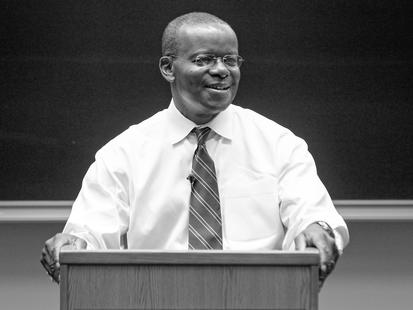
Vincent Rague
MBA ’84, Co-Founder and Director, Catalyst Principal Partners
Industry
Alumnus Offers Insight on Africa's Critical Inflection Point
"For a long time, when people talked about Africa, they talked about civil wars, hunger, dictatorships, etc.," said Vincent Rague (MBA ’84), co-founder and director of Catalyst Principal Partners, during the second annual Darden Africa Business Conference "Africa: Open for Business."
"One has to bear in mind that with more than 50 countries in Africa today, there are only a handful of turbulence spots on the continent — there are no more than three, four, five countries at any one time. That’s a 90 percent area of stability, which is remarkable for a continent of that enormity.” Rague, who is based in Nairobi, Kenya, demonstrated with a map showing the magnitude of the continent, which could hold the areas of some of the world’s largest countries.
In part, this stability is underpinned by Africa's sound economic fundamentals, supported by robust economic growth, improving governance, a growing middle class and increased government investment in infrastructure that promises long-term economic growth trends. "Africa has one of the fastest growing middle classes in the world, with some estimates showing that the middle class in Africa today is larger than the middle class in India," Rague explained. "Instances of corruption still exist, but they are in decline because an activist civil society and the community itself has become much more vigilant. … The emerging middle class is now more educated, has traveled the world, has aspirations, and is therefore demanding high levels of accountability and better political governance."
"In addition to the middle class, Africa has one of the fastest growing populations, with rapid rural-urban migration, and that creates demand for goods and services," said Rague. He detailed that in 1990, African cities were populated by approximately 2 million people. By 2007, that number was 400 million, and projections indicate that by 2050, it will be up to 1.4 billion. "You can look at this either as a negative [or a positive], but as a business person, you have to see this as a positive and an opportunity," Rague noted.
Mirroring this urban growth is Africa's gross domestic product. In an analysis by The Economist, sub-Saharan Africa has been home to six of the 10 fastest-growing economies on the globe over the last 10 years.
Asia is taking note. China is the largest of Africa's emerging partners, with more than $200 billion in trade. "At the same time, there has been a shift from dependence on bilateral grants and development aid to more foreign direct investment," Rague explained. Where countries like Brazil, Turkey, Korea and India had little to no trade with Africa a decade ago, the trade flows are now in the tens of billions of dollars."
Rague’s parting words offered advice to investors: "You cannot wait for the market to be right for you to go in. The day you do that, you lose. As they say, you blink, you lose. And Africa is at that critical inflection point where if you’re not in there today, you’ll have to pay a higher price to come in later."